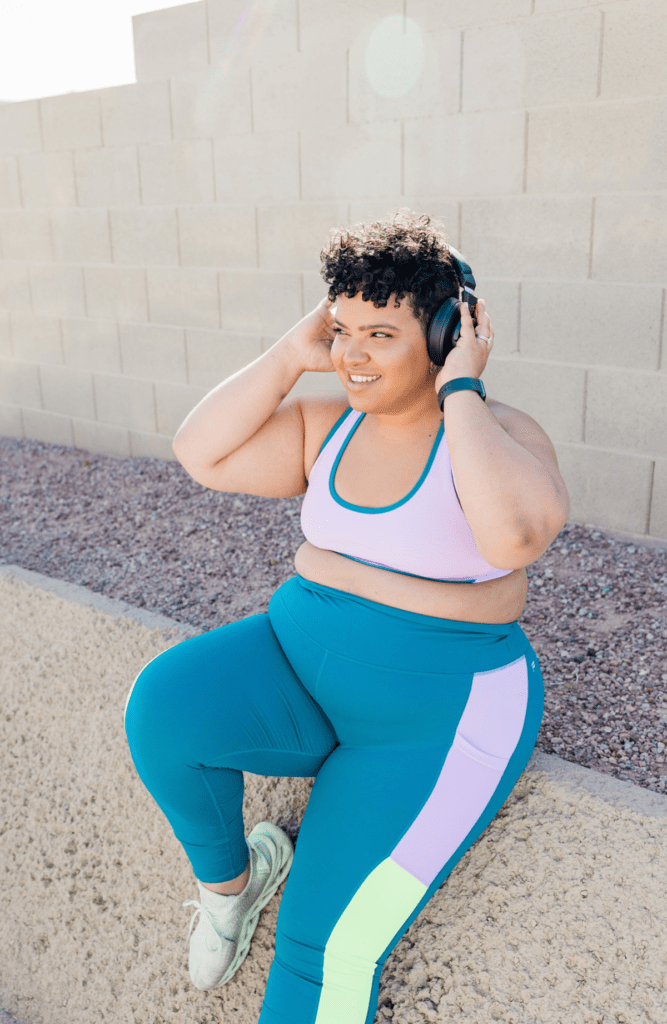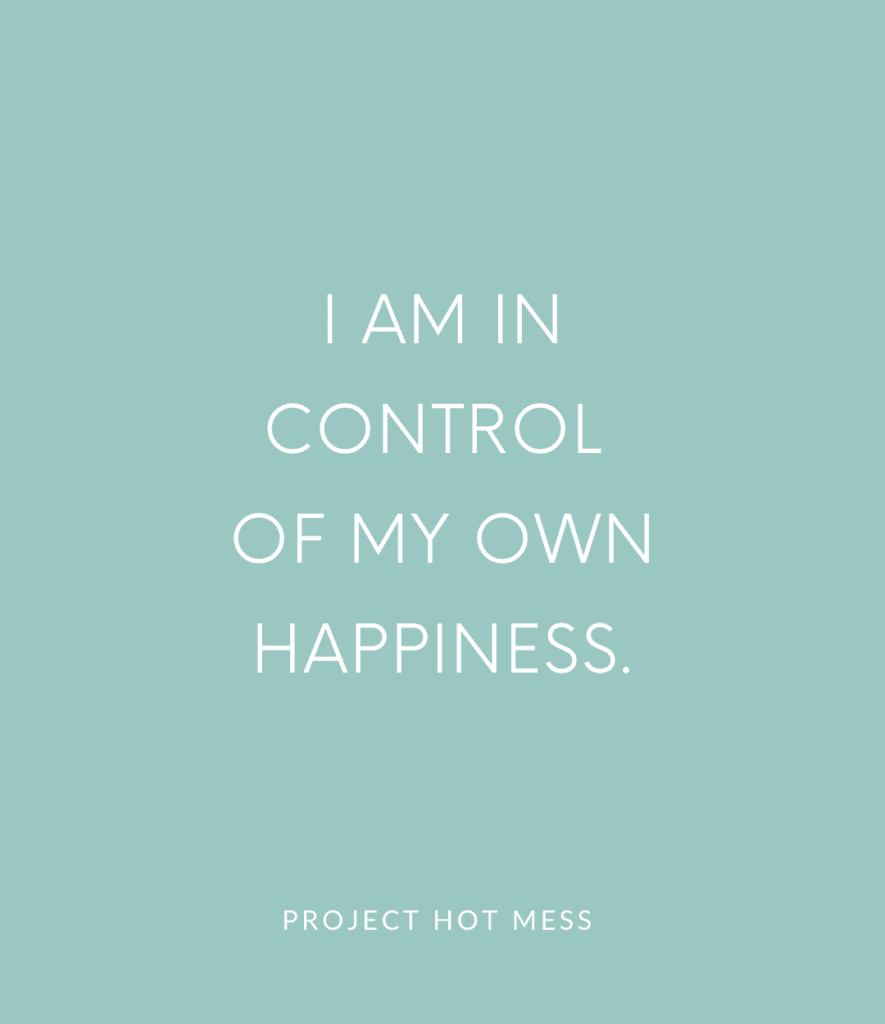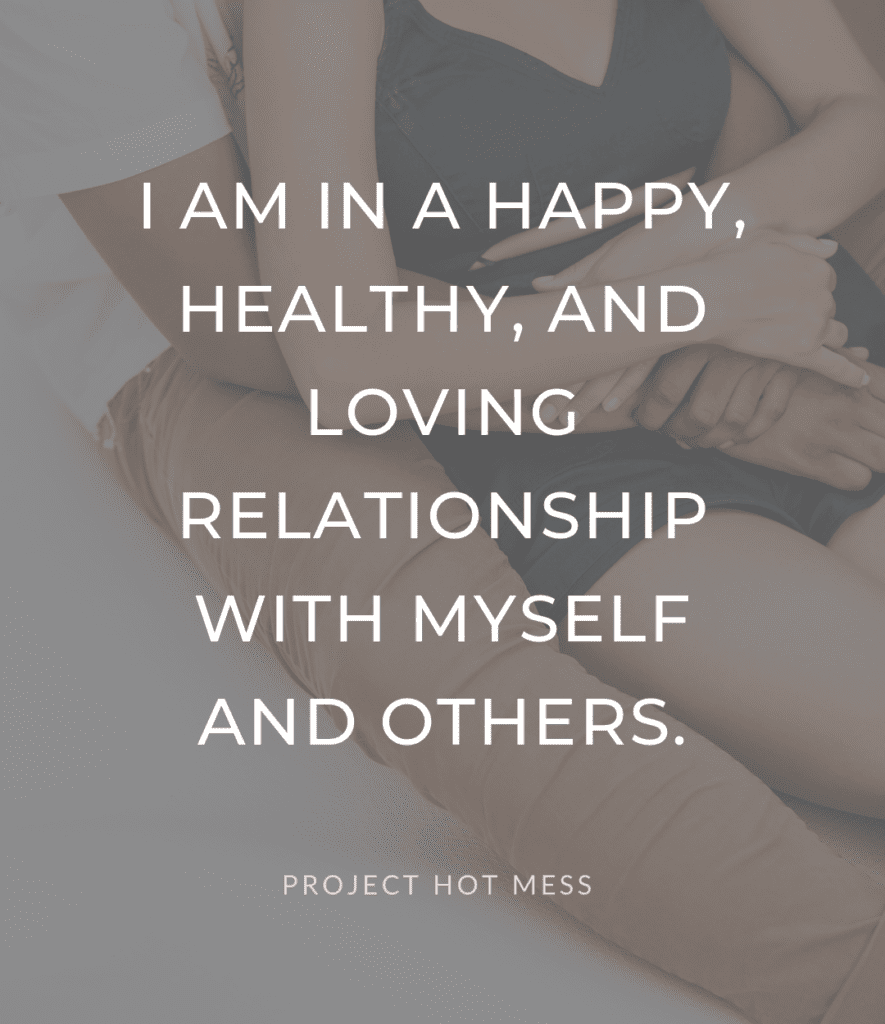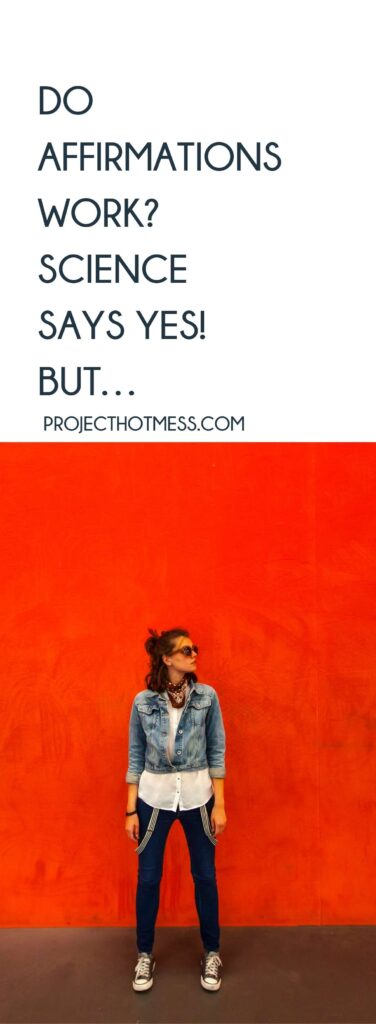Do Affirmations Work? Science Says Yes! But… 
If you’ve heard of affirmations, you’ve likely heard from someone raving about how adding positive affirmations to their daily routines has made a massive difference to their self-esteem and helped them manifest a life they loved (was it me…? Did I tell you that..?).
And while this is a very common result of using affirmations, I know you’re here because you’re wondering do affirmations work? Like really, do they really work?
The short answer… is yes! And no…
But it’s not that straightforward, as with most things that involve neuroscience, there is evidence for and against affirmations, but you need to understand first of all what affirmations are (and thus, what they are not) and what it is you’re trying to achieve by using positive affirmations.

What Are Affirmations?
While the idea of using positive affirmations may seem a little unusual and strange to start with, the definition of positive affirmations is incredibly simple – they are positive statements designed to challenge negative or unhelpful thoughts.
Pretty simple right?
These positive statements can be used about yourself – as seen in the ‘I am..’ statements, they can be used to motivate you, encourage you, empower you, and bring focus to the positive things in your life, all while promoting positive self-talk.
They’re also quick and simple to use, can be done anywhere, and are a great easy way to switch up a negative thought and replace it with a positive thought.
The power of affirmations comes from working on the subconscious mind, using positive thinking as a way to overcome a negative belief and negative self-talk.
While these positive self-statements may help create immediate happy feelings and help you get that instant win feeling, the real benefits of positive affirmations actually run much deeper than that.
Read More: What Are Affirmations? (And How To Use Them Properly)

What Affirmations Are Not
While it’s easy to see what affirmations are, it is also important to understand what affirmations are not.
They aren’t magic (even though sometimes the results can feel quite magical). They are science-based and evidence-based, so while you may feel a little woo-woo using them to start off with, have peace of mind understanding that our brain is an incredibly powerful tool and you’re simply feeding it information for it to use to create powerful, positive connections.
With that being said, they’re also a tool, not a cure-all.
Affirmations should form part of your overall mental health toolkit, and can be used to assist in other positive psychological practices, such as Cognitive Behavioural Therapy and personalized counseling.

What Are You Trying To Achieve By Using Affirmations?
Another aspect you need to be mindful of and that can influence the effectiveness of positive affirmations are the outcomes you are trying to achieve? What are you expecting positive affirmations to do for you?
While they are used as a manifesting tool with the principles of the Law of Attraction and are promoted by almost all of the self-help gurus, simply repeating to yourself every day that you’re going to get a promotion at work, or that you’re going to be a millionaire, isn’t going to get you the promotion and isn’t going to make you a millionaire.
Affirmations are one step to influencing your mindset, but outcomes are achieved from the actions you take.
While a positive mindset does play a part in this, it’s important to understand what you want to achieve by using positive affirmations, the expectations you have, and the limitations of their use.

What Does Science Say About Positive Affirmations?
While the idea of neuroscience sounds incredibly complex, the way positive affirmations work in our brain is quite simple.
In one study, MRI’s show that when someone says a positive affirmation, it lights up the reward centers of our brain, triggering future-based reward orientations.
This study also found that those who were affirmed (as opposed to those who weren’t) were more likely to make changes to sedentary behavior, and highlighted that key neural pathways were amplified in conjunction with successful positive affirmation.
Another study commented on how positive affirmations bring about a more expansive view of the self, weakening the implications of a threat for personal integrity, such as negative thoughts.
They go on to say that positive affirmations have been shown to improve education, health, and relationship outcomes, with benefits that sometimes persist for months and years.
Interestingly enough, one study found that the positive effects of affirmations could be measured without awareness of the affirmations themselves. That is, repeating positive affirmations without a goal or expectation of what you’re wanting to achieve with the affirmations, could still result in positive neurological effects.
The study went on to find that in some cases, increased awareness of the potential for positive effects actually led to a decline in positive reported effects.

Affirmations and Neuroplasticity
Neuroplasticity is the idea that our brain is ever-evolving and ever-changing – more specifically, that our brain can form new neural pathways to either relearn a process (such as movements after a traumatic spinal injury) or new neural connections from new information and stimuli.
When it comes to affirmations and neuroplasticity, the connection can be drawn that affirmations serve as new information and stimuli, in an attempt to override old information.
In short, the new positive affirmations override the old negative thoughts, and thus works on the neuroplasticity of the brain to create these new neural pathways, allowing our brain to reprogram itself to opt for the new information, positive thoughts, and not the old pathways, the negative thoughts.

Who Can Use Positive Affirmations?
With benefits like reducing stress and anxiety, increasing performance, and increasing self-confidence and self-esteem, it’s fair to say that most people can benefit from using positive affirmations.
You may have even used them yourself at some stage in your life without even realizing it! Ever give yourself a little pep talk (you can do this!). Then you’ve used a positive affirmation.
Positive affirmations are quite common amongst elite athletes with studies showing that positive self talk, such as positive affirmations, can actually increase the performance of athletes.
Keep in mind, while positive affirmations may work for some people, just as all things, they aren’t for everyone. If you’ve tried them, and you find they’re not for you, that’s okay! There are tons of other ways you can improve your self-confidence and self-esteem.

How To Use Positive Affirmations?
One of the important things that had been reiterated across several studies was the need to use positive affirmations on a regular basis in order to experience the benefits.
Daily affirmations that focus on the present tense (‘I am’ rather than ‘I will’) are a great place to start.
Regular repetition of daily positive affirmations can help by reinforcing new positive thought patterns, rather than reliving negative thoughts that are created from negative experiences and some past experiences (sometimes they may not have even seemed negative at the time, but our unconscious mind creates belief systems based and core values based on our experiences).

While it’s entirely up to you to decide the best affirmation or set of affirmations for yourself, and the best time to practice them, you can try a range of different techniques or styles and different affirmations to find ones that fit your own personal goals.
Using positive affirmations as a self-help strategy that focuses on specific areas you want to work on can help you see a positive impact sooner than using more vague or generalized affirmations too.
One of the easiest ways to practice your daily affirmations is the simple method of reciting the affirmations to yourself as you stand in front of the mirror. This can feel a little awkward at first but seeing yourself while speaking your affirmations can help activate different areas of the brain and can be a great way to create a positive habit and ritual around saying your affirmations daily.
Examples Of Positive Affirmations
There is a wide range of positive affirmations you can use, for a whole host of different circumstances, and it’s up to you to choose which ones resonate with you and that you feel would help you the most.
Some examples include:

Positive Affirmations For Self Love Examples
1. I love myself just as I am.
2. I accept myself completely.
3. I approve of myself.
4. My body is strong and healthy.
5. I deserve to be happy and loved.

6. I am worthy of all the good in life.
7. I am lovable and capable of being loved.
8. I forgive myself for my mistakes.
9. I am doing the best I can with what I have.
10. I am worthy of love, respect, and happiness.
Read More: 101 Self-Love Affirmations – Daily Positive Affirmations To Build Your Self Esteem

Positive Affirmations For Anxiety Examples
1. I am safe.
2. Everything is going to be okay.
3. I am in control of my thoughts and emotions.
4. I am calm and relaxed.
5. I am surrounded by people who support and love me.

6. I can handle anything that comes my way.
7. I am confident and capable.
8. I trust myself and my decisions.
9. I am allowed to make mistakes.
10. I am perfectly imperfect.

Positive Affirmations For Happiness Examples
1. I am happy with who I am becoming.
2. I am grateful for what I have.
3. I choose to be happy and positive.
4. My happiness comes from within.
5. I am surrounded by love and joy.

6. I am in control of my own happiness.
7. Life is a journey, and I am enjoying the ride.
8. Everything happens for a reason.
9. I am open to new and wonderful experiences.
10. I am happy and content with my life just as it is.

Positive Affirmations For Love Examples
1. I am open to love and ready for a great relationship.
2. I am confident and deserving of love.
3. I radiate love and attract it into my life.
4. I am kind, compassionate, and loving to myself and others.
5. I am ready for a healthy, happy, and loving relationship.

6. I am open to new love and experiences.
7. Love is all around me and I accept it into my life.
8. I am worthy of being loved and cherished.
9. I give and receive love freely and unconditionally.
10. I am in a happy, healthy, and loving relationship with myself and others.
Read More: 77 Positive Affirmations For Love, Relationships, and Marriage

So, Do Affirmations Work?
That’s a lot of information to wrap your head around, but the crux of it is, do affirmations actually work?
The science says they do, but there are a few things you need to keep in mind.
Affirmations alone aren’t enough to create a positive mental health change and should be used in conjunction with other psychotherapies, and with the assistance of a psychologist, psychiatrist, or counselor.
With that being said, they are a great starting point that is easy for you to implement and can help you make some positive changes, feeling like you’re moving forwards with your own mental health.
In addition, the science also reiterates the need to use affirmations daily, and on a regular basis, in order to see the positive effects.

Saying a positive affirmation every now and then might make you feel good for the moment, but to really see the amazing neurological benefits that can come with positive affirmations, you need to make them part of your daily practice.
Adding affirmations into your daily routine, whether it’s first thing of a morning, or as you journal at night, or at any other time that makes sense for you, will ensure you are using affirmations regularly and help you to see the positive benefits.
And finally, affirmations are an individual and personal exploration and awareness of self. You don’t need to use the same ones as everyone else, you can find ones that resonate with you, use the same ones over and over again, or create your own (be sure to make them positive and not contradictory).
Hopefully with this in mind, you’ll be able to find some great positive affirmations that resonate with you and that can help you increase your self-esteem, boost your confidence, and promote positive self-talk.











